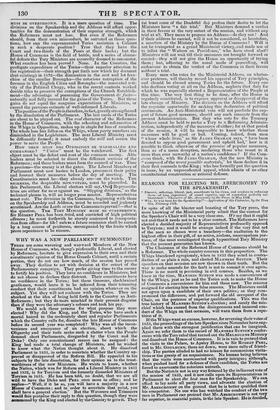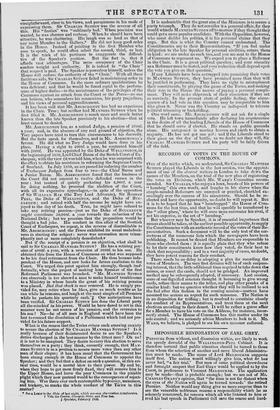REASONS FOR ELECTING MR. ABERCROMBY TO THE SPEAKERSHIP.
" Discreet, reflecting, liberal, just, considerate in his views, and resolute in enforcing them—of long experience, of sound sagacity, and of reputation perfectly un- blemished."—Charartcr If Mr. Abereromby by Me Tines, in May 1834. " Why, he was born for the Speakership!"—Apptication of this Character, by Me Trua Sun, February 1835.
IN spite of all the bluster and boasting of the Tory press, the more knowing of the Ministerial party admit that the contest for the Speaker's Chair will be a very close one. We say that it ought not and that it needs not to be a close contest. The Reformers have elected a decided majority of Representatives professedly opposed to Toryism ; and it would be strange indeed if the very first act of the men so chosen were a treachery—the exaltation to the highest office in their gift, of an active, zealous, unscrupulous par- tisan, of the most unmitigated though hypocritical Tory Ministry that the present generation has known. The Chairman of the Reformed House of Commons should be a Reformer. The whole country concurs in this proposition. The Whigs blundered egregiously, when in 1833 they acted in contra- diction of so plain a rule, and elected MANNERS Surrosr. Their speeches on that occasion are now thrown in their teeth. But the way to make amends for the fault is not to commit it over again. There is no merit in persisting in evil courses. Besides, as we knew at the time, MANNERS SUTTON was made a convenience of by the Whigs, just as he and the Tories seek to make the House of Commons a convenience for him and them now. The reasons assigned for electing him were false reasons. The Ministers could not agree upon a candidate of their own politics ; so they com- promised the difference, and put forward the old occupant of the Chair, on the pretence of superior qualifications. This was the true history of MANNERS Surrores election; and surely the mis- chief which has ensued from the disingenuous and immoral con- duct of the Whigs on that occasion, will warn them from a repe-
tition of it.
If the Whigs want an excuse, however, for reversing their votes of
1833, the proceedings of the late Speaker since November have sup- plied them with the strongest justification that can be imagined. Again we refer them to the record of MANNERS SUTTON'S confer- ences with the Tory cabal that turned out the MELBOURNE Ministry and dissolved the House of Commons. It is in vain to pretend that the visits to the Palace, to Apsley House, to Sir ROBERT PEEL, and to Mr. GOULBURN, there set down, were mere calls of friend- ship. The parties alluded to had no leisure for ceremonious visita- tions or the gossip of an acquaintance. No human being believes that the visits were unconnected with party intrigue; although, when pushed hard for a defence of their candidate, the Tories are forced to asseverate the notorious untruth. But the Nation is not in any way fettered by the indiscreet vote of
the session of 1833, and it now calls upon its Representatives in Parliament to elect the best man for the Speakership. We can afford to lay aside all party views, and advocate the election of Mr. ABERCROMBY on the ground that he is better qualified than his competitor. No one who has watched the conduct of the two men in Parliament can pretend that Mr. ABERCROMAY is not very far superior, in essential points, to the late Speaker. He is decided, etraightforward, clear in his Views, and perspicuous in his mode of expressing them. Sir CHARLES Surrost was the reverse of all this. His " fustian's was " sublimely bad." 'When precision was wanted, he was obscure and verbose. When he should have been attentive, he was chattering. His laugh was as loud as that of any- noisy Member in the Gallery.* Ile did not keep good order in the House. Instead of pointing to the first Member who rose to speak, he would often select the second, third, or last. It is the trick of his partisans to exaggerate the difficul- ties of the Speaker's position. But the fact is, that it affords 'vast advantages. The mere occupancy of the Chair confers weight and authority. It is indeed to "the Chair" that respect is paid. The Speaker is powerless himself, unless the House will enforce the authority of the "Chair." With all these factitious aids, Sir CHARLES SUTTON failed in maintaining order in the House of Commons. In the mere ordinary qualifications he was deficient ; and that he would be found equal to the perform- ance of higher duties—to the maintenance of the privileges of the Commons against an attack from the Court or the Peers—no one can believe, who remembers his connexions, his party prejudices, and his views of personal aggrandizement. It has been said that Mr. ABERCROMBY has had no experience in the Chair. True ; but neither had MANNERS SUTTON when he first filled it. Mr. ABERCROMBY is much more and much better known than the late Speaker previously to his election—that at least cannot be denied. Mr. ABERCROMBY has, as a retired Judge, a pension of 2000/. a year; and, in the absence of any real ground of objection, the Tory papers have tried to turn this circumstance to his discredit. But the facts speak for themselves, and in Mi. ABERCROMBY's favour. He did what no Tory Judge would have done in his place. Having a right to 40001. a year, he contented himself with 2000/. He was appointed by the Duke of WELLiiverox, in the beginnin „rr of 1830, Lord Chief Baron of the Scotch Court of Ex- chequer, with the view (it was told him, when he was surprised with the offer) to obtain his assistance in reforming the Supreme Courts of Scotland. In July 1830, an act passed for reducing the number of Exchequer Judges from four to two—the Chief Baron and a Junior Baron. Mr. ABERCROMBY found that the business of the Court did not amount to twelve defended causes in the year : but instead of quietly pocketing his 4,000/. a year for doing nothing, he procured the abolition of the Court, with all its expensive appendages,—in spite of the opposition of Sir WILLIAM RAE (the Tory Lord Advocate), Sir ROBERT PEEL, the Duke of WELLINGTON, and the Duke of Bue- CLEUCH; and retired with half the income he might have en- joyed to the day of his death. True, he might have refused to take any retiring pension—just as the Duke of BUCCLEUCH might contribute 50,000/. a year towards the reduction of the National Debt ; but we presume that the proposition would be thought a bad joke. His conduct in this affair of the Scottish Court of Exchequer, we repeat, is the reverse of discreditable to Mr. ABERCROMBY ; and the Times exhibited its usual maladroit- ness in starting the subject : never was accusation more trium- phantly met or more completely demolished.t But if the receipt of a pension is an objection, what shall be said to Sit' CHARLES MANNERS SUTTON? He has a. retiring pen- sion of 4000/. a year, with a reversion of 3000/. to his son. He obtained this from the House of Commons on what was supposed to be his final retirement from the Chair. He thus became inde- pendent of the House, and now looks for future exaltation to the Court. We urged this point against him strongly, though inef- fectually, when the project of making him Speaker of the first Reformed Parliament was broached. "Mr. MANNERS Surrost (we observed) is too shrewd a man to make himself troublesome to a Ministry in whose hands the grant of his retiring pension was placed. But that check is now removed. He is snugly pro- vided for, may retire when he likes, give as much trouble as he can while he remains, and laugh at the most simple of all Premiers while he pockets his quarterly cash."* Our anticipations have been verified. Sir CHARLES SUTTON has done the Liberal party all the mischief in ins power. Would he have dared to act in this manner were he not secure of his pension, and the reversion to his son ? No—he of all men in England would have been the last to counsel the dissolution of a Parliament which had not pro- Tided for his future support. What is the reason that the Tories evince such amazing anxiety to secure the election of Sir CHARLES MANNERS SUTTON? IS it really because of their disinterested desire to see the Speaker's duties discharged in the best manner by the fittest man ? Oh no ! it is not to be imagined. They desire to carry this election to serve themselves as a party; they think, correctly enough, that MAN- =as Surrox is in a position to secure more votes than any other man of their clique; it has been usual that the Government has been strong enough in the House of Commons to appoint the Speaker; and they feel that a defeat on such a question, at this cri- tical time, would be a mortal blow to their power. By and by, when they hope to get more firmly fixed, they will remove him to the Upper House, and leave the poor Commons in the pitiable plight which they now pretend would be the consequence of reject- ing him. Was there ever such contemptible hypocrisy, meanness, and trickery, as marks the whole conduct of the Tories in this matter?
* Sees Letter in the Globe of hst night, ullieti our on obs-rvation notroboratee. f Vide Ibe Courenr, Chrortiele,171o6r, soft True Site. Spectator, February MS. It is undeniable that the great aim of the Ministers is to secure a party triumph. They do not consider it a personal affair, for they would whistle MANNeas Surrers off to-morrow if they thought they could get a more popular candidate. With the Opposition, however, who must dislike his politics, it is his personal claims that they urge. But this is what the Country cannot understand. The Constituencies say to their Representatives, "If you feel under obligation to the late Speaker for personal civilities, return them in kind : we are under no such ties,and you are sent to the House of Commons to represent us. We expect you to place a Reformer in the Chair. It is a great political question; and your sincerity as a Reformer must be tested, and your reelection shall depend upon the vote you give on that question." If any Liberals have been entrapped into promising their votes to MANNERS SUTTON, they have promised more than they will be justified in performing. They have no right to misrepresent their constituents, by playing the game of the Tories, and making their vote in the House the means of paying a personal compli- ment. They will make shipwreck of their characters if they act so unwisely. In the present state of public feeling, the conse- quence of a bad vote on this question may be irreparable to him who gives it. Never was the Country so indisposed to tolerate political trimming or backsliding. One word more. Mr. ABERCROMBY will not ask for a single vote. He left town immediately after declaring his acquiescence in the desire of all the leading Liberals of the House of Commons that he should serve if elected. He stands on public grounds alone. His antagonist is moving heaven and earth to obtain a majority. He has not got one yet: and if the Liberals stand to their guns on the day of battle, as we doubt not they will, Sir CHARLES MANNERS SUTTON and his party will be fairly driven off the field.
























 Previous page
Previous page